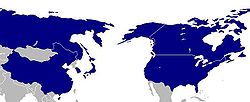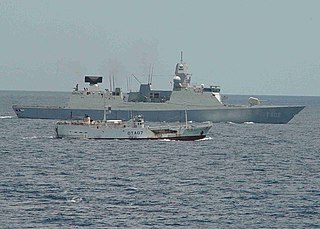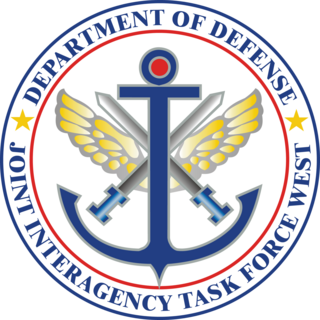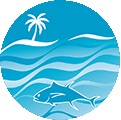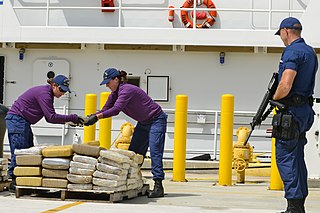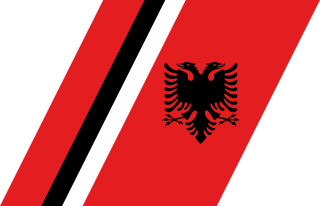Member Countries Shown in Blue | |
| Formation | 2000 |
|---|---|
| Type | Regional Cooperation Initiative |
| Headquarters | Meetings Rotate Between Member States |
Membership | 6 member states |
The North Pacific Coast Guard Forum (NPCGF) was initiated by the Japan Coast Guard in 2000 as a venue to foster multilateral cooperation through the sharing of information on matters related to combined operations, exchange of information, illegal drug trafficking, maritime security, fisheries enforcement, illegal migration, and maritime domain awareness. The current membership includes agencies from Canada, China, Japan, South Korea, Russia, and the United States. [1]

The Japan Coast Guard is the Japanese coast guard. Comprising about 12,000 personnel, it is under the oversight of the Ministry of Land, Infrastructure, Transport and Tourism, and is responsible for the protection of the coastline of Japan. It was founded in 1948.
Maritime security is frequently defined as the protection from threats to the freedom or good order at sea. Issues clustered under the notion of maritime security include crimes such as piracy, armed robbery at sea, trafficking of people and illicit goods, illegal fishing or pollution. Often inter-state rivalry and violence extremism is also included in the definition. As a concept and agenda maritime security has evolved since the early 2000s, when in particular concerns over terrorist attacks on port facilities sparked interest in security in the maritime domain. Several states and international organisations have since outlined maritime security strategies. It is in particular piracy in Southeast Asia, off the coast of Somalia and in West Africa which has triggered recognition for the detrimental effects of maritime insecurities for economic development, human security as well as the environment.
Maritime domain awareness (MDA) is defined by the International Maritime Organization as the effective understanding of anything associated with the maritime domain that could impact the security, safety, economy, or environment. The maritime domain is defined as all areas and things of, on, under, relating to, adjacent to, or bordering on a sea, ocean, or other navigable waterway, including all maritime-related activities, infrastructure, people, cargo, and vessels and other conveyances.
Contents
- Continued work
- Role model
- 8th North Pacific Coast Guard Forum Summit in St. Petersburg, Russia
- References
The first Forum was held in Tokyo in 2000 and has followed an alternating semi-annual cycle of technical experts and principals meetings since. Between 2000 and 2005, meetings were sponsored by Japan, Russia, United States, South Korea, Canada and Japan.
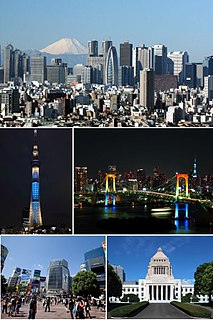
Tokyo, officially Tokyo Metropolis, one of the 47 prefectures of Japan, has served as the Japanese capital since 1869. As of 2018, the Greater Tokyo Area ranked as the most populous metropolitan area in the world. The urban area houses the seat of the Emperor of Japan, of the Japanese government and of the National Diet. Tokyo forms part of the Kantō region on the southeastern side of Japan's main island, Honshu, and includes the Izu Islands and Ogasawara Islands. Tokyo was formerly named Edo when Shōgun Tokugawa Ieyasu made the city his headquarters in 1603. It became the capital after Emperor Meiji moved his seat to the city from Kyoto in 1868; at that time Edo was renamed Tokyo. Tokyo Metropolis formed in 1943 from the merger of the former Tokyo Prefecture and the city of Tokyo. Tokyo is often referred to as a city but is officially known and governed as a "metropolitan prefecture", which differs from and combines elements of a city and a prefecture, a characteristic unique to Tokyo.

Russia, officially the Russian Federation, is a transcontinental country in Eastern Europe and North Asia. At 17,125,200 square kilometres (6,612,100 sq mi), Russia is by a considerable margin the largest country in the world by area, covering more than one-eighth of the Earth's inhabited land area, and the ninth most populous, with about 146.77 million people as of 2019, including Crimea. About 77% of the population live in the western, European part of the country. Russia's capital, Moscow, is one of the largest cities in the world and the second largest city in Europe; other major cities include Saint Petersburg, Novosibirsk, Yekaterinburg and Nizhny Novgorod. Extending across the entirety of Northern Asia and much of Eastern Europe, Russia spans eleven time zones and incorporates a wide range of environments and landforms. From northwest to southeast, Russia shares land borders with Norway, Finland, Estonia, Latvia, Lithuania and Poland, Belarus, Ukraine, Georgia, Azerbaijan, Kazakhstan, China, Mongolia and North Korea. It shares maritime borders with Japan by the Sea of Okhotsk and the U.S. state of Alaska across the Bering Strait. However, Russia recognises two more countries that border it, Abkhazia and South Ossetia, both of which are internationally recognized as parts of Georgia.

The United States of America (USA), commonly known as the United States or America, is a country comprising 50 states, a federal district, five major self-governing territories, and various possessions. At 3.8 million square miles, the United States is the world's third or fourth largest country by total area and is slightly smaller than the entire continent of Europe's 3.9 million square miles. With a population of over 327 million people, the U.S. is the third most populous country. The capital is Washington, D.C., and the largest city by population is New York City. Forty-eight states and the capital's federal district are contiguous in North America between Canada and Mexico. The State of Alaska is in the northwest corner of North America, bordered by Canada to the east and across the Bering Strait from Russia to the west. The State of Hawaii is an archipelago in the mid-Pacific Ocean. The U.S. territories are scattered about the Pacific Ocean and the Caribbean Sea, stretching across nine official time zones. The extremely diverse geography, climate, and wildlife of the United States make it one of the world's 17 megadiverse countries.
The forum has had success in documenting best practices from the member countries in areas of illegal drug trafficking, maritime security, fisheries enforcement and illegal migration, has a web-based information exchange system, and has published a manual for combined operations.
